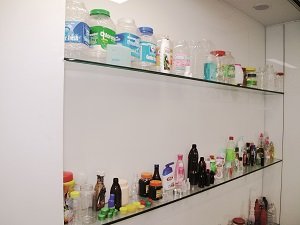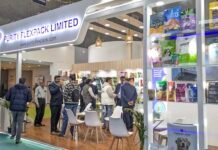INPACK primarily serves clients in the food and beverages, dairy, pharmaceuticals, consumer goods, cosmetics and confectionery segments. Sharma informed that a high level of trustworthiness is the basis of the long-standing, strong and stable relationship that his company enjoys with its clients. The design for the different types of products are provided by the clients to INPACK with full reassurance that their designs will not be tampered in any way. The design specifications are followed to the last detail by INPACK via their highly advanced processes.
Polypropylene cap production
INPACK uses three distinct processes for manufacturing plastic containers like jars, bottles, caps and closures. These are injection stretch blow molding (ISBM), extrusion blow molding (EBM) and injection molding (IM). IM is used for producing caps wherein a ram or screw-type plunger forces the molten plastic material into a mold cavity that gradually solidifies and matches the shape and form of the specific cap mold. According to Sharma, INPACK can produce 75 million (7.5 crore) caps in a month for a single stock keeping unit.
When asked about the the different types of caps that INPACK makes for different products and brands, he named Goodnight Refill cap, closure and cups for Goodnight AER car perfume made of PCTA (a special type of resin); Marico Nihar hair oil cap that is tamper evident; Bisleri crown-shaped closure for carbonated soft drink application; caps for Parachute Jasmine with multi-cavity mold for high production. The company uses its Nissei ASB, FANUC, Feromatik Milacron, Uniloy and Toshiba machines to produce PP caps.
Steady and speedy growth

of the biggest brands in the food,
cosmetic and pharmaceutical sectors
According to Sharma, INPACK is growing at 18-22% year on year and expects to grow more than 25% in FY 2017-18. He attributed the higher growth projection in the coming year to the new investment the company made in 2016. The tremendous growth that the food processing and pharmaceutical sectors are achieving is a good indicator of the kind of opportunities that INPACK believes it can leverage in the years ahead.
When asked about export performance, Sharma was candid enough to admit that it is limited to a couple of South Asian countries like Bangladesh and Nepal and the quantum is quite low. The company presently owns four plants, which are located in Baddi (Himachal Pradesh), Pantnagar (Uttarakhand), Guwahati (Assam) and Silvassa (in the Union Territory of Dadra and Nagar Haveli). More than 40 machines of varying make, design and capacities are installed across these plants and they all combine to produce more than 150 different types of packaging products for more than 30 clients.











